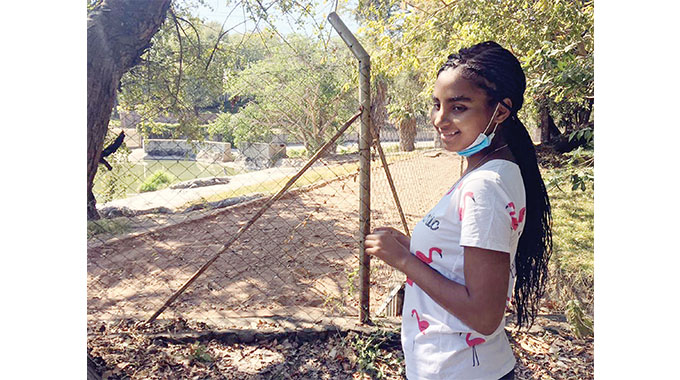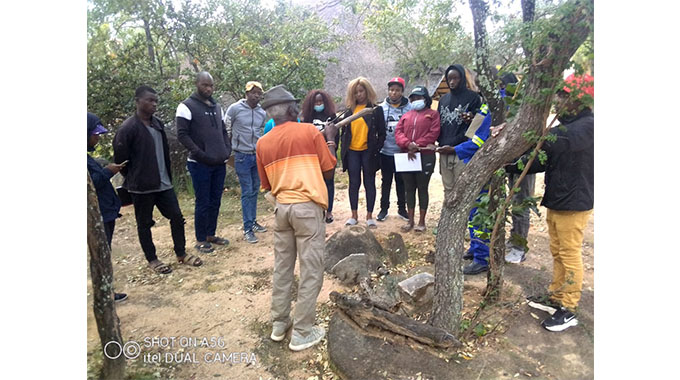
Raymond Jaravaza, Showbiz Correspondent
The sight of wild animals roaming about became a routine for soon to be 18-year-old Sherkeirah Chanelle Stoddart who grew up on a farm and to an extent, influenced her to become a safari tour guide.
Long regarded as a men’s domain, safari guiding in Zimbabwe is synonymous with escorting tourists — foreign and local, to sightseeing the vast spectacular scenery of the country’s national parks and experiencing the beauty of the flora and fauna.
While young women her age are preoccupied with the latest fashion trends and the “hottest” topics on social media, Stoddart, a former Solusi High School student, is hard at work learning every detail about the country’s wild animals and plant species that make Zimbabwe a preferred tourist destination globally.
It’s a career path that women have generally shied away from.
For anyone who has been on a game drive, it is common to expect the safari guide to be a muscular gentleman clad in a khaki shirt and a pair of trousers, a reassuring figure that you can trust your life with even when confronted by a raging elephant or buffalo bull.
How did it all start for the aspiring young safari guide?
“I grew up on a farm in Solusi and I’ve always been fascinated by animals, both wild and domestic. From a young age, I knew that I wanted a career dealing with animals, plants and the environment so training as a safari guide was a natural choice.
“I settled for a school called Becks School of Tracking, Hunting and Guiding run by an experienced safari guide Ashley Ndebele who has been in the industry for years and it’s been an exciting journey,” Stoddart told Saturday Leisure.
According to an online tourism magazine – expertafrica.com — Zimbabwe’s safari guides are among the best safari guides in Africa. This is because they have to go through a four-year certification process — one of the most difficult guide licence procedures in Africa.
“Firstly, they have to pass the Learner’s theory examination where their knowledge of the environment, the ecology, vegetation, geography, birds and wildlife, first aid, firearms and ballistics as well as environmental and tourism laws are tested,” notes the magazine.
After that, the learner safari guide has to spend a minimum of two years working under the tutorship of a safari guide with a full licence.
Through this, learner guides will gain extensive experience of working in the bush and guiding clients through the national parks (including walking safaris, game drives and usually hunting safaris).

A Binga villager talks to safari guide students in Binga during a culture exchange programme
Finally, the learner guide has to pass an extensive and reputedly very tough week-long practical examination to ensure his/ her guiding, knowledge and firearm skills are in order to earn his/ her Professional Safari Guide Licence.
“We’re sitting for our Learner Pro Hunter’s Licence examination which is administered by Zimparks (Zimbabwe Parks and Wildlife Management) in September and I have to know everything from the environment, tourism laws to firearms and ballistics. It’s the most difficult exam and everyone in the class is terrified,” Stoddart explained.
She says she now has a better appreciation of issues such as poaching, wildlife conservation and the plight of communities that live around national parks and nature reserves since enrolling for the safari guide course.
“I think people, in general, underestimate the effects of poaching, not only on tourism, but also the ecosystem and possible extinction of some animal and plant species. This course has taught us to appreciate how devastating poaching really is.
“If, for instance, poachers use dangerous chemicals like cyanide to kill elephants for their trunks, the effects will still be felt years after the incident. I think it’s important for schools to start teaching tourism as early as primary school so that kids appreciate the importance of managing our wild animals, plants and the environment,” she added.
Ndebele, the director of Becks School of Tracking, Hunting, said the intake of female safari guides has been steadily increasing over the years.
“The passion that these young female safari guides have for tourism will push them to become some of the best tour guides in the future.
It’s rare to find an 18-year-old like Stoddart showing so much enthusiasm for the industry and having her and other young ladies enrolling for the Learner Pro Hunters’ Licence is good for the safari tour business and women empowerment as well,” said Ndebele.
He said his school strives to produce safari guides that can lead guests safely through the bush, giving them an unforgettable experience inside the country’s national parks.
Male student Severino Mutote feels challenged to pull his socks against aspiring female safari guides in his class.
“They work twice as hard as us, the male students because they always feel that they have to prove a point that whatever we can do, they can do even better. Stoddart is very competitive and passionate about wildlife and the plight of communities such as the Tongas who live on the margins of national parks.
“We’ve even discussed the idea of starting a non-governmental organisation that helps communities better understand issues like human and wildlife conflict and other charitable work,” said Mutote.
Being a future female safari guide, Stoddart is not fazed by the stereotyping that comes with working in a so-called “men’s domain”.
“People always ask me if I’ll be able to hold a firearm while at work and I tell them that weapon handling and living in the bush is all part of the job and I’ll do it much better than men.
“I’m lucky to have supportive parents, Gertie and Nelson Stoddart, who have taught me to believe in myself and always strive to be the best in whatever I do,” she added.
Every year Zimbabwe welcomes thousands of tourists eager to explore the country’s landscape and diverse wildlife within national parks and nature reserves.
It is therefore, pleasing to note that the tourism future looks bright with young aspiring guides like Stoddart who are very enthused to be part of the journey. — @RaymondJaravaza.
